#canadian geographic
Explore tagged Tumblr posts
Text

A humpback whale breaches in the Great Bear Rainforest, B.C.
Photo: Michelle Valberg
#michelle valberg#photographer#humpback whale#whale#animal#great bear rainforest#british columbia#canadian geographic#canada#nature
156 notes
·
View notes
Text
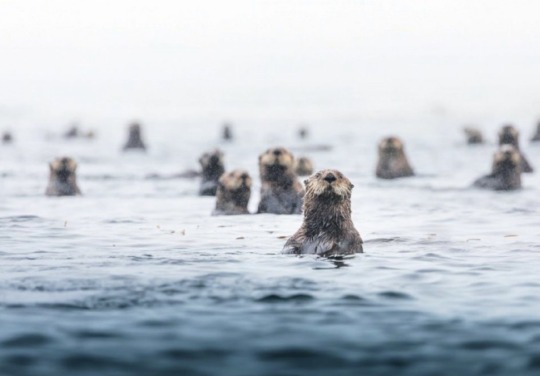
Chase Teron
Winner, Aquatic Life, Canadian Geographic Annual Wildlife Photography Competition 2023
A curious group of sea otters near Spring Island, off the western coast of Vancover Island.
110 notes
·
View notes
Text


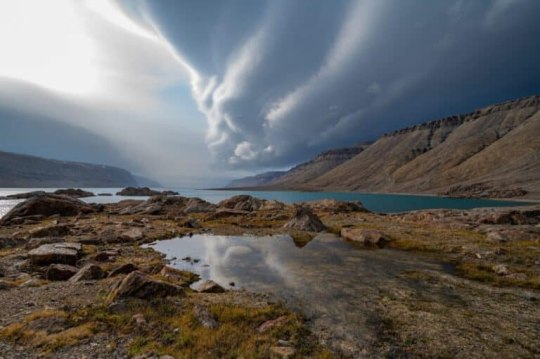
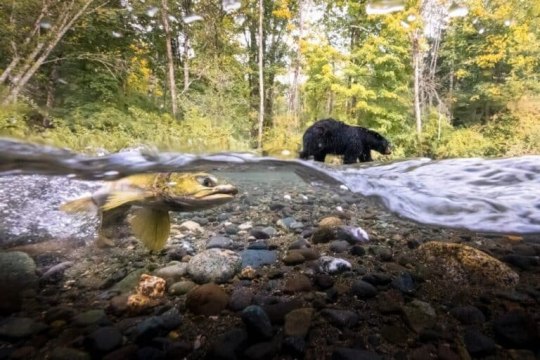
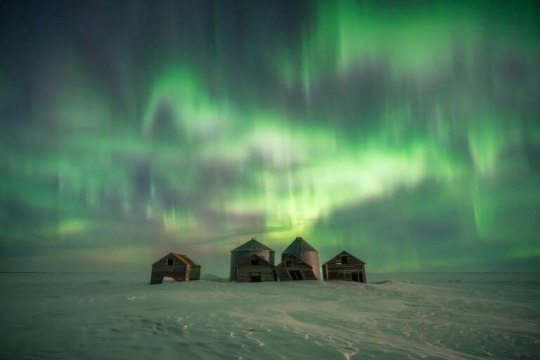
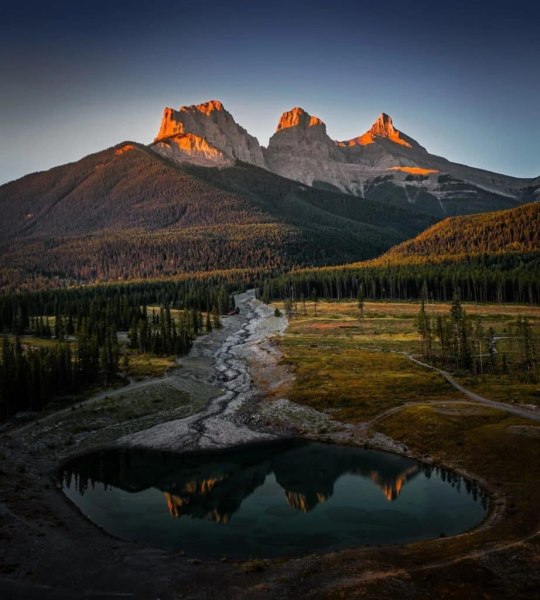
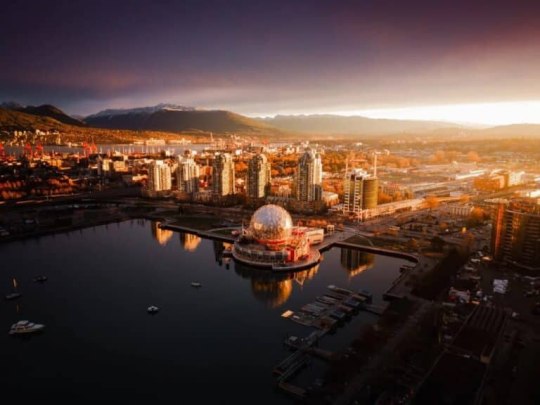
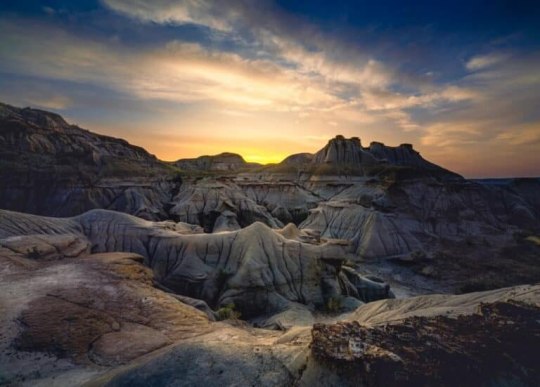


قامت مجلة Canadian Geographic باختيار أفضل الصور وأكثر اللحظات إثارةً، والتي التقطتها عدسات المصورين لعام 2023.
5 notes
·
View notes
Text

Royal Canadian Geographical Society's 2024 Impact Report
This has been an extraordinary year for the Royal Canadian Geographical Society:
One of our expeditions discovered the wreck of the Quest;
Canadian Geographic became Canada's top paid-circulation magazine;
We supported field research that extended public understanding of Canada and the natural world.
I commend our CEO John Geiger and his staff for their stellar accomplishments.
📕 http://via.maharaj.org/rcgs24
#rcgs#frcgs#geographical#geography#canada#royal canadian geographical society#canadian geographic#geographica#canadian
0 notes
Text
0 notes
Photo
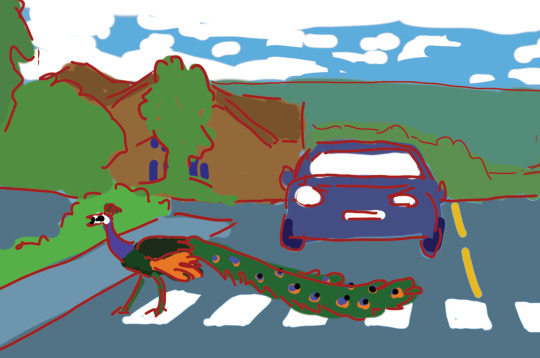

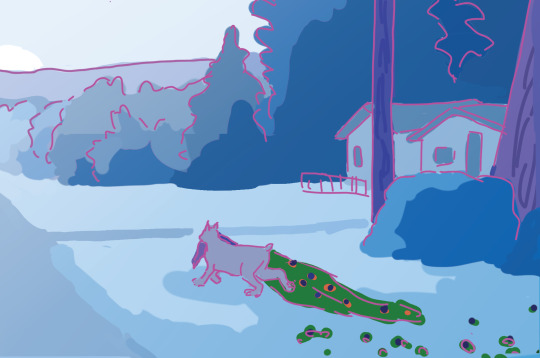

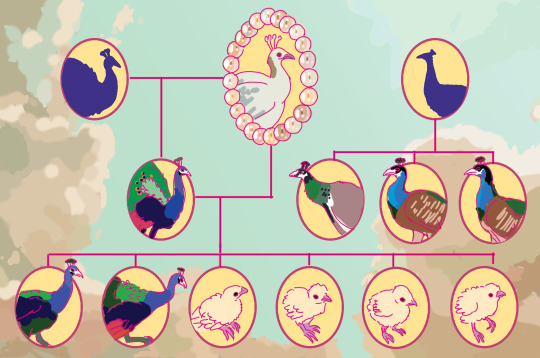
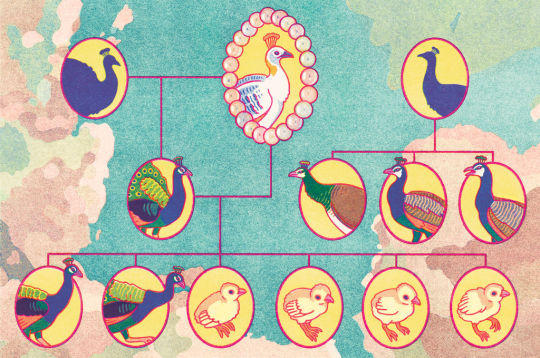
a bit ago I illustrated an article in The Walrus, and here's the full process for anyone interested!
it was about feral peacocks that got dumped in this small town and started breeding. there were two dumping events - the first was a mom and her chick (who went on to inbreed), and the other was three juveniles.
my first two ideas showed how the peacocks disrupted the town (perching in flower pots and blocking traffic), the next showed how one of the peacocks got eaten by a lynx, and the last two were family trees. The Walrus went with the ‘angelic’ tree, with Pearl the peacock surrounded by a string of pearls.
1K notes
·
View notes
Text
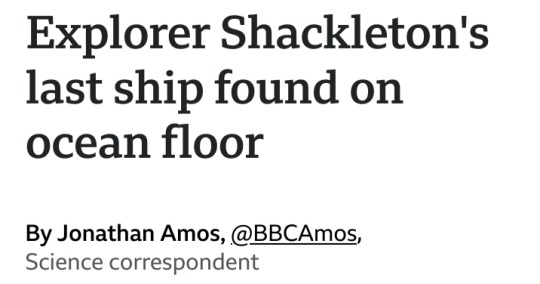
12 June 2024
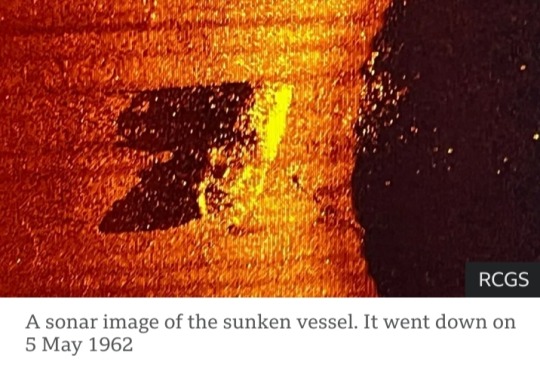
Wreck hunters have found the ship on which the famous polar explorer Ernest Shackleton made his final voyage.
The vessel, called "Quest," has been located on the seafloor off the coast of Newfoundland, Canada.
Shackleton suffered a fatal heart attack on board on 5 January 1922 while trying to reach the Antarctic.
And although Quest continued in service until it sank in 1962, the earlier link with the explorer gives it great historic significance.
The British-Irish adventurer is celebrated for his exploits in Antarctica at a time when very few people had visited the frozen wilderness.
"His final voyage kind of ended that Heroic Age of Exploration, of polar exploration, certainly in the south," said renowned shipwreck hunter David Mearns, who directed the successful search operation.
"Afterwards, it was what you would call the scientific age. In the pantheon of polar ships, Quest is definitely an icon," he told BBC News.
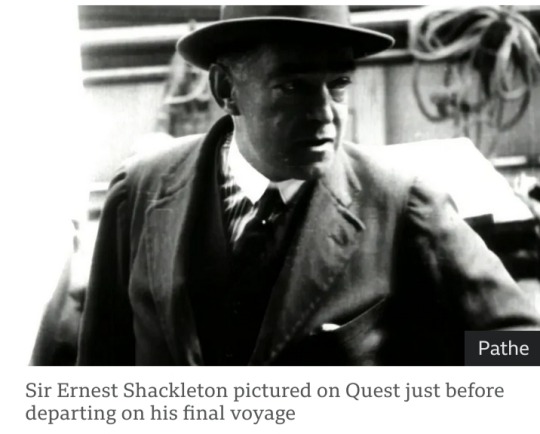
The remains of the ship, a 38m-long schooner-rigged steamship, were discovered at the bottom of the Labrador Sea on Sunday by a team led by The Royal Canadian Geographical Society (RCGS).
Sonar equipment found it in 390m (1,280ft) of water. The wreck is sitting almost upright on a seafloor that has been scoured at some point in the past by the passing of icebergs.
The main mast is broken and hanging over the port side, but otherwise, the ship appears to be broadly intact.
Quest was being used by Norwegian sealers in its last days. Its sinking was caused by thick sea-ice, which pierced the hull and sent it to the deep.
The irony, of course, is this was the exact same damage inflicted on Shackleton's Endurance - the ship he used on his ill-fated Imperial Trans-Antarctic Expedition of 1914–1917.
Fortunately, the crews of both Endurance, in 1915, and Quest, in 1962, survived.
Indeed, many of the men who escaped the Endurance sinking signed up for Shackleton's last polar mission in 1921-1922, using Quest.
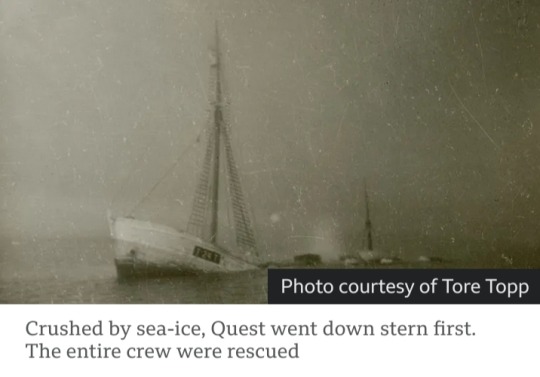
His original plan had been to explore the Arctic, north of Alaska, but when the Canadian government withdrew financial support, the expedition headed south in Quest to the Antarctic.
The new goal was to map Antarctic islands, collect specimens and look for places to install infrastructure, such as weather stations.
Shackleton never made it, however, struck down by heart failure in the Port of Grytviken on the British Overseas Territory of South Georgia, the last stop before reaching the White Continent. He was just 47 years old.
After his death, Quest was involved in other important expeditions, including the 1930-31 British Arctic Air Route Expedition led by British explorer Gino Watkins, who himself tragically died aged 25 while exploring Greenland.
Quest was also employed in Arctic rescues and served in the Royal Canadian Navy during WWII, before being turned over to the sealers.
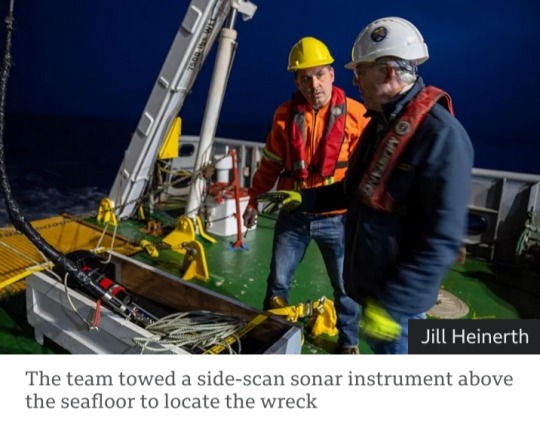
The RCGS team members carried out extensive research to find Quest's last resting place.
Information was gathered from ship's logs, navigation records, photographs, and documents from the inquiry into her loss.
The calculated sinking location in the Labrador Sea was pretty much spot on, although the exact co-ordinates are being held back for the time being.
A second visit to the wreck, possibly later this year, will do a more complete investigation.
"Right now, we don't intend to touch the wreck. It actually lies in an already protected area for wildlife, so nobody should be touching it," associate search director Antoine Normandin said.
"But we do hope to go back and photograph it with a remotely operated vehicle, to really understand its state."
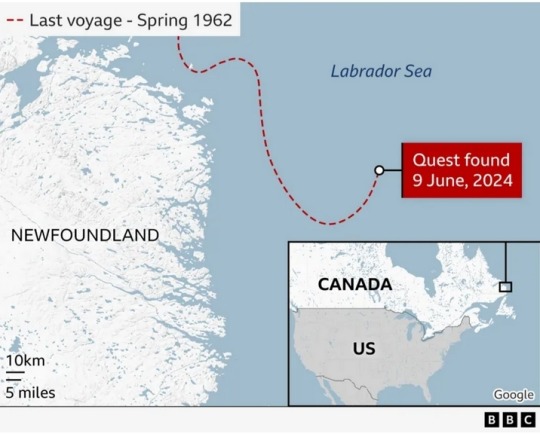
Alexandra Shackleton is the explorer's granddaughter and was patron to the RCGS survey.
"I was thrilled, really excited to hear the news; I have relief and happiness and a huge admiration for the members of the team," she told BBC News.
"For me, this represents the last discovery in the Shackleton story. It completes the circle."
The explorer continues to spark interest more than a century after his death.
Hundreds of people visit his grave on South Georgia every year to pay their respects to the man known by his crews simply as "The Boss."
"Shackleton will live forever as one of the greatest explorers of all time, not just because of what he achieved in exploration but for the way he did it, and the way he looked after his men," said David Mearns.
"His story is timeless and will be told again and again; and I'm just one of many disciples who'll keep telling it for as long as I can."
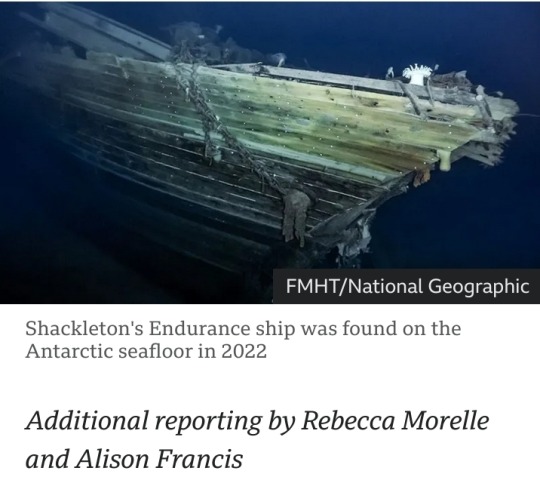
—
Sir Ernest Henry Shackleton CVO OBE FRGS FRSGS (15 February 1874 – 5 January 1922) was an Anglo-Irish Antarctic explorer who led three British expeditions to the Antarctic.
He was one of the principal figures of the period known as the Heroic Age of Antarctic Exploration.
#Ernest Shackleton#Quest#Newfoundland#Canada#Antarctic#polar explorer#shipwreck hunter#shipwreck#Labrador Sea#The Royal Canadian Geographical Society (RCGS)#Endurance#1930-31 British Arctic Air Route Expedition#Gino Watkins#sonar instrument#Heroic Age of Antarctic Exploration#Sir Ernest Henry Shackleton#British expeditions
64 notes
·
View notes
Text

17 notes
·
View notes
Text
My mind trying to decide which pwhl team to be my fav;
Toronto: I love women
Montréal: I love women
Ottawa: I love women
New York: I love women
Boston: I love women
Minnesota: I love women
#montreal is giving me pou and stacey#ottawa is giving me emerance#toronto is giving me nurse maltais and spooner#for new york i’m an isles fan#i’m loving minnesota’s vibes#and boston has hilary knight (even tho i’m canadian)#i have no geographical connection or loyalties so i’m struggling#pwhl#pwhl toronto#pwhl montreal#pwhl new york#pwhl boston#pwhl minnesota#pwhl ottawa
42 notes
·
View notes
Text

The amazing sea wolves of the Great Bear Rainforest
The wolves eat only the brain of the salmon, which allows them to avoid tapeworm and other parasites found in the raw flesh.
(Photo: Klaus Pommerenke)
#klaus pommerenke#photographer#sea wolves#wolf#animal#mammal#wildlife#great bear rainforest#nature#canadian geographic
356 notes
·
View notes
Text
It looks like someone who is late for an emergency meeting! The Lizard " throat Helicopter" takes trotting on legs as a defensive way to escape the dangers as it can travel distances more quickly and see clearly distance farther, and a sudden change in position may confuse the predator.
#usawildlife#uk wildlife#australian wildlife#canadian wildlife#Brazlianwildlife#animals#geography#national geographic
3 notes
·
View notes
Text
Shout out to my friend Stefan who, upon meeting @girlcavalcanti , who is from Italy, asked her what her "favourite thing in western culture is".
I love Stefan, but am afraid to find out where on earth he thought Italy was.
#not at bad as my friend who didn't know Libya was in africa despite being born there#or my friend who thought Cambodia was in Africa#the canadian education system is not very geographically focused
5 notes
·
View notes
Text

Zen
#naturelovers#nature#nature photo#nature photography#nikon#nikoncanada#nikon photography#nikon d850#squirrels#squirrel#cute#adorable#animal#animals#wild#wildlife#wildlife photography#photos#photo#photography#photographer#photo of the day#photo of the week#canadian photo#canadian photographer#canadian photography#saskatchewan photography#saskatchewan photo#natural#national geographic
5 notes
·
View notes
Text
Read Gender Failure by Ivan Coyote and Rae Spoon, absolutely fantastic
#I wish I had read the book sooner!#Rae Spoon is from the Canadian prairies like me. And Ivan was the name of my grandfather who I model my masculinity after#I enjoyed the snippets of songs and discussion of how queer identities interact with Canadian cowboy culture#my grandfather was very much a cowboy/outdoors man and being little and visiting him in the mountains inspired me to become a geographer#I loved the bit about prairie grass being compared to gender identity as well. how something that doesn’t seem complex has so much nuance
12 notes
·
View notes
Text
9/11 birthdays are rlly something else in that I remember this one time my sister told me when she was in kindergarten her teacher said smth like “today is a very important day, I don’t expect any of you to know this but does anyone know the reason?” And she raised her hand and excitedly said “It’s my sister’s birthday!!”
#9/11#9/11 birthday#rambling#I’m not even American so that’s interesting#well#I’m Canadian though which is still p close geographically and history-wise#hopefully this isn’t tone deaf#it really was a tragic loss of life#and also tragic how ppl still today are the target of racism bc of it#just thought I’d share a funny awkward story
8 notes
·
View notes